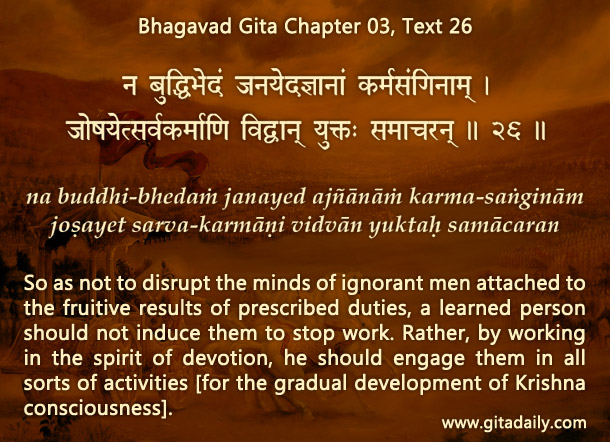Will ethical self-assessment increase our guilt? – If we are told to assess ourselves ethically, we may fear, “I already feel guilty because I can’t live up to the expected moral standard. Won’t ethical self-assessment just increase my guilt?”
No, because ethical self-assessment is meant for increasing our understanding of our psychophysical nature and our level of spiritual evolution, thus helping us seek moral standards that can help us grow from our present position.
Suppose we strive to fast without water on a sacred day like Ekadashi and fail repeatedly. Ethical self-assessment may help us understand that we have a bodily constitution (such as a pitta prakrti according to Ayurveda) which makes fasting unbearably painful. With this understanding we may unapologetically lower our expectation from ourselves regarding fasting and purposefully direct our endeavors for disciplined devotion toward another, more compatible avenue. Thus, ethical self-assessment can protect us from the unhealthy guilt that arises when we rate ourselves using an unsuitable standard.
Additionally, Gita wisdom explains that we all are souls on a multi-life journey of spiritual evolution, and that we all are at different places in this evolutionary journey. Pertinently, the Bhagavad-gita (03.26) urges us to not disturb others by expecting from them commitments way beyond their levels. And this Gita directive can apply not just to how we treat others but also how we treat ourselves. After all, the same Gita (03.26) urges us to elevate ourselves with ourselves, not degrade ourselves with ourselves. Together, these verses imply that we use ethical self-assessment to help ourselves rise, not beat ourselves down.
One-sentence summary.
Ethical self-assessment protects us from unhealthy guilt by helping us seek moral standards compatible with our psychophysical nature and our level of spiritual evolution.
Think it over:
- How does guilt become unhealthy?
- How does ethical self-assessment protect us from unhealthy guilt?
- Do you feel guilty about something? How can you deal with that guilt using ethical self-assessment?
***
03.26: So as not to disrupt the minds of ignorant men attached to the fruitive results of prescribed duties, a learned person should not induce them to stop work. Rather, by working in the spirit of devotion, he should engage them in all sorts of activities [for the gradual development of Krishna consciousness].
To know more about this verse, please click on the image


Nice, please keep it up